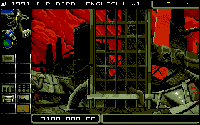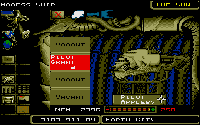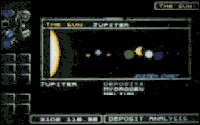Athousand years have passed and still a hundred different rumours persist. Was there ever a moonbase? Did man once span the system or is it a myth? The seven(teen) generation itch has smitten the citizens of Earth City; now they must explore.
Legend has it that Earth City was a mere 'colony' reinstated on the Earth after some catastrophe killed the planet! Now, after years of training and research, Earth City can solve the riddle. A monumental community effort will be needed to organise this space quest, not only for moonbase, but for the exotic minerals that will fuel the conquest of space.
Tinker, tailor, soldier, pilot...
First and foremost people have to be trained so they can build, research and fly the craft from Earth. Drafted in small batches they can be assigned a skill: mariner, scientist or artisan. If a job needs to be done, then one of the three 'classes' will eventually gain the skills. Obviously, a punter pulled straight from Earth City's streets cannot build a star-ship, they need to construct simpler devices to grow in competence.
The ability to design the kit is not God-given either. Research teams start with simple plans for a mining derrick - to the Earth's resources - and a rough plan for orbital factories. Assigning them to research the orbital dream, whilst Production build derricks, which gets two tasks running simultaneously. When shuttle craft have been built, pilots are made orbit-to-Earth ferrymen, which earns them the sill to fly the Interplanetary Operation Ships (IOS) that Production will build, as soon as Research have finished designing them.
This is where Deuteros' time system makes its play. Time only advances when you click the clock icon. This means you can visit as many locations as you own, giving different orders to individuals, then with one click forward in time the jobs are undertaken simultaneously. There is a possibility of having 16 different orbital factories, and the time system means multi-tasking orders is possible, as is maximising your resources.
As your knowledge grows, so does the ability to roam the solar system. Ensuring each orbital factory has the right people, following the right instructions, with the right machines is the first challenge. A mental dexterity test, Deuteros forces players to develop a heavy save game habit - just in case. It is beautifully judged in the pace department though, and just as a job threatens to become a chore, up pops Researc who say they have plans for a whizy piece of kit that will do it automatically.
Novel ideal
Deuteros plays like a well written novel. Everyone of your minions has a name, and as they spread across the sky, they develop a history. Outrageous behaviour results, such as sending pilots wandering simply so they log the necessary hours to become an Admiral.
Along the route are real shocks; jolting surprises that no amount of planning can prepare you for. To supplement this horror factor are teasers: equipment that requires exotic minerals to build. These force an immediate change of plan, as you chase the new materials, in order for the new machine to be built, so that you can find out exactly what it does.
The nature of Deuteros means few plot details are given away, otherwise the anticipation and terror of exploring strange new worlds, boldly going where no man has gone before (or have they?), will not have the full effect. The challenge is huge and the plot twists are totally unpredictable. This taints any feelings of success, when everything starts coming together, with an acute fear of the unknown. The smug feeling of competence when easily manipulating machines that were once unwieldy, balances this tension and increases the enjoyment quota.
Try or die
Deuteros is a learning experience, and those who want instant fireworks need not apply. Just enough information is given throughout to reward those players brave enough to experiment. Try or die, is the Deuteros motto.
Strategy games need to employ more than the Amiga's processing power to be great, they must use graphics and sound too. Deuteros wins through here. Each screen comprises of both easily accessed icons and a theme setting picture, backed up with a particular sound effect. Animated sequences become more frequent and make certain situations real knife-edge affairs, no matter how often they occur.
Deuteros is a massive project. Its character is supplemented with both idiosyncrasies and suferfluous touches - the light switch in Earth City training actually works! It challenges, bemuses and rewards in equal portions. What starts as tentative exploration grows into a personal crusade to colonise the stars; it simply demands to be played to completion. Very few strategy games are actually exciting but Deuteros is gripping. It looks good, sounds great and plays like a dream.
The plot slowly unfolds as a test of nerve, judgement and intuition. As your empire grows so does the game, embroiling you in a struggle for survival and galactic dominance. Deuteros is, as they say, the business. Try it if you dare.



 He could not organise an explosion in a methane factory...
He could not organise an explosion in a methane factory...



